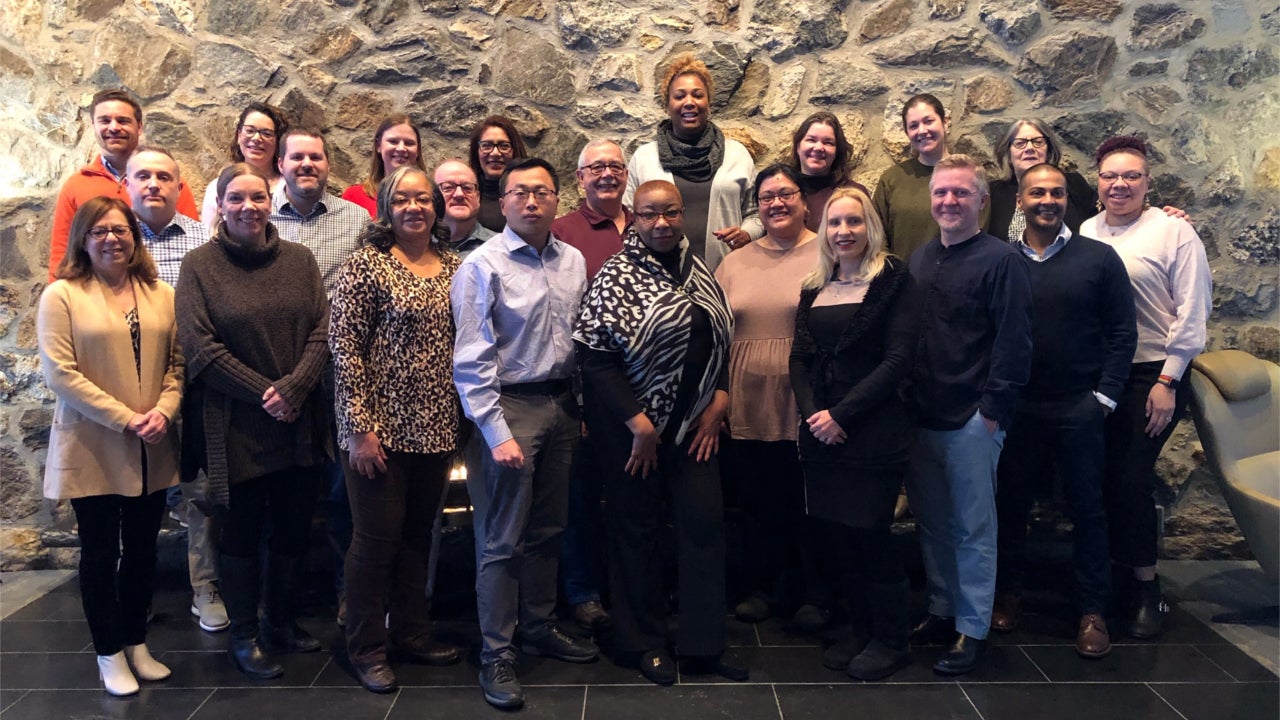We are pleased to bring you the latest edition of the Economic Opportunities Program’s newsletter! Learn how EOP and its initiatives are working to help low- and moderate-income Americans thrive in a changing economy.
Advancing Opportunity in an Uncertain Economy
We are in an extraordinary time, and the rapid changes in our economic landscape that have accompanied the coronavirus epidemic are having a devastating impact on both low-wage workers and on small businesses. Emerging data suggest low-income workers, entrepreneurs of color, and immigrant and marginalized communities are bearing a disproportionate burden in this crisis in terms of lost jobs, lost businesses, and, most alarmingly, imperiled health and lost lives. These data are disturbing, and they highlight the need to focus on relief for these communities in the near term and building an economy in which we all can thrive over the long term. In this edition of the Economic Opportunities Program‘s newsletter, we share how EOP and its initiatives are responding to this changed context and focusing on ideas that can help low-wage workers and small business access the support they need to survive this crisis. At the same time, we continue to advance strategies, policies, and ideas that can help all people thrive in the changing US economy. We hope this newsletter finds you well, and we look forward to working with you in the work ahead.
This Time Do Everything to Support Workers
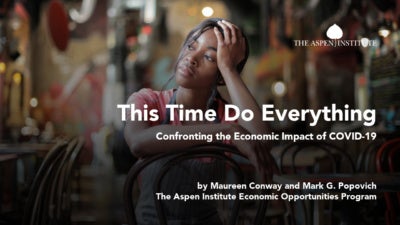 As the COVID-19 pandemic brings the economy to a standstill, the people most affected by this economic collapse are those least equipped to sustain the hit. In 2008, we took extraordinary measures to protect our financial system from the fallout of the Great Recession. But we failed to do enough for workers. In this piece, EOP Executive Director Maureen Conway and Good Companies/Good Jobs Initiative Director Mark Popovich call for urgent action to protect workers and families from economic calamity. Government, businesses, and individuals all need to learn the lessons of 2008 and do what they can to protect the lives and livelihoods of millions. Read more.
As the COVID-19 pandemic brings the economy to a standstill, the people most affected by this economic collapse are those least equipped to sustain the hit. In 2008, we took extraordinary measures to protect our financial system from the fallout of the Great Recession. But we failed to do enough for workers. In this piece, EOP Executive Director Maureen Conway and Good Companies/Good Jobs Initiative Director Mark Popovich call for urgent action to protect workers and families from economic calamity. Government, businesses, and individuals all need to learn the lessons of 2008 and do what they can to protect the lives and livelihoods of millions. Read more.
Making Sure Vulnerable Small Businesses Aren’t Left Behind
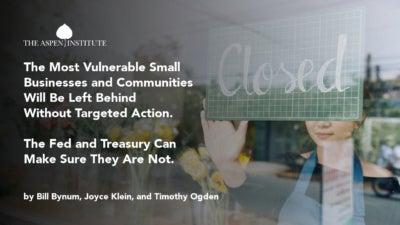 Small businesses in low-income communities are at risk of being left out of the new stimulus package. In a new blog post, Business Ownership Initiative Director Joyce Klein, Tim Ogden of the Financial Access Initiative, and Bill Bynum of Hope Credit Union call for a new strategy to keep these businesses and the financial institutions that support them afloat while the economy is slow. Taking action now will allow these organizations to continue serving small business owners, while also preparing them for new lending to spur recovery in these communities when we all return to work. Dozens of organizations have cosigned our call-to-action to bring needed relief for these organizations and communities that are at risk of being left out of the stimulus and recovery. To add your organization to the list, email boi@aspeninst.org. Read more.
Small businesses in low-income communities are at risk of being left out of the new stimulus package. In a new blog post, Business Ownership Initiative Director Joyce Klein, Tim Ogden of the Financial Access Initiative, and Bill Bynum of Hope Credit Union call for a new strategy to keep these businesses and the financial institutions that support them afloat while the economy is slow. Taking action now will allow these organizations to continue serving small business owners, while also preparing them for new lending to spur recovery in these communities when we all return to work. Dozens of organizations have cosigned our call-to-action to bring needed relief for these organizations and communities that are at risk of being left out of the stimulus and recovery. To add your organization to the list, email boi@aspeninst.org. Read more.
Advancing Entrepreneurship Discussions Online
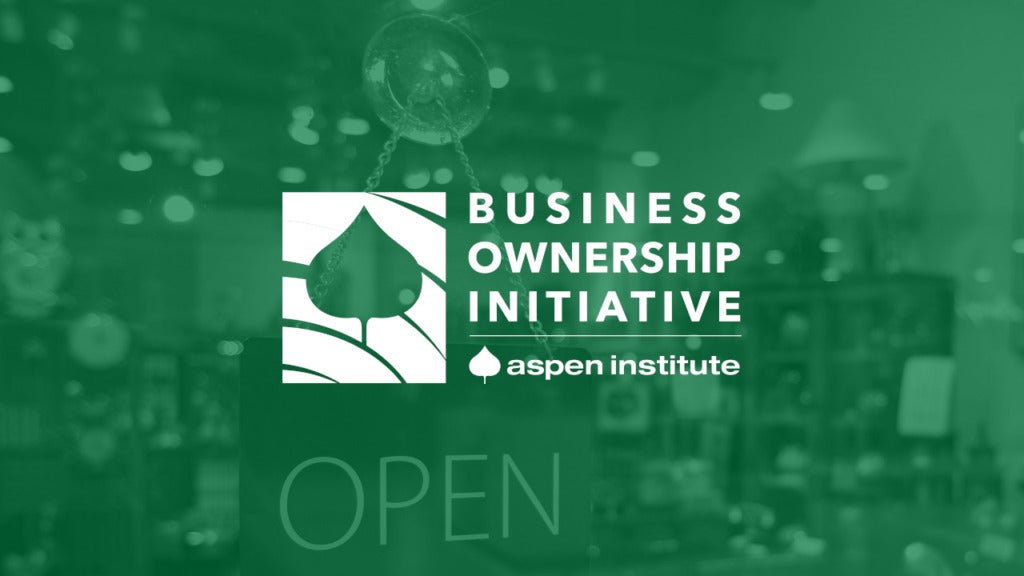 BOI also co-hosted a webinar with the Financial Access Initiative to discuss strategies to support small businesses during the COVID-19 pandemic and refine the plan described in the blog post.
BOI also co-hosted a webinar with the Financial Access Initiative to discuss strategies to support small businesses during the COVID-19 pandemic and refine the plan described in the blog post.
Funders, investors, and government agencies participated in a virtual roundtable hosted by BOI to discuss the essential role that the members of the Microfinance Impact Collaborative (MIC) play in reaching entrepreneurs of color and LMI business owners, and the impacts that the MIC members were experiencing as they work with their micro and small business clients. The roundtable was later followed by a webinar in which BOI presented an analysis of how the COVID-19 crisis is affecting the ability of the MIC members to engage in relief and recovery lending programs, and presented a collective solution for how funders could address the liquidity challenges faced by MIC members.
COVID-19 and Unemployment Insurance
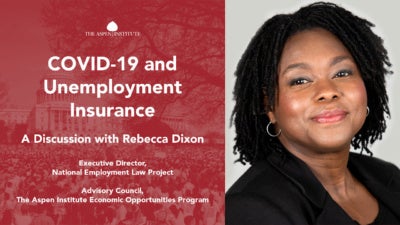 In the midst of the COVID-19 crisis, our unemployment numbers are simply devastating. Millions of people are suddenly without an income and may be without health insurance in the midst of a pandemic. The human costs of this economic dislocation are profound. How can the unemployment insurance system respond to this crisis? To answer this question, we turned to Rebecca Dixon, Executive Director of the National Employment Law Project and the newest member of the Economic Opportunities Program’s Advisory Council, to talk about unemployment insurance—how it works, who it helps, and how it might better meet the needs of the people who find themselves in need in our current crisis. EOP Executive Director Maureen Conway did a one-on-one interview with Rebecca, followed by a live Q&A discussion with hundreds of virtual attendees. We invite you to watch the interview and watch the Q&A.
In the midst of the COVID-19 crisis, our unemployment numbers are simply devastating. Millions of people are suddenly without an income and may be without health insurance in the midst of a pandemic. The human costs of this economic dislocation are profound. How can the unemployment insurance system respond to this crisis? To answer this question, we turned to Rebecca Dixon, Executive Director of the National Employment Law Project and the newest member of the Economic Opportunities Program’s Advisory Council, to talk about unemployment insurance—how it works, who it helps, and how it might better meet the needs of the people who find themselves in need in our current crisis. EOP Executive Director Maureen Conway did a one-on-one interview with Rebecca, followed by a live Q&A discussion with hundreds of virtual attendees. We invite you to watch the interview and watch the Q&A.
Job Quality in the Age of COVID-19
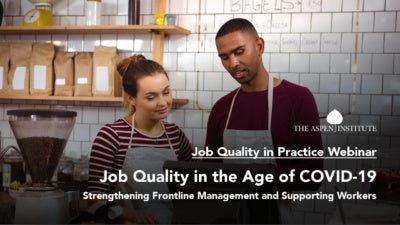 For many workers, jobs with low wages and limited benefits have left them uniquely vulnerable in the context of today’s pandemic. In our Job Quality in Practice series, we hosted a webinar with leaders from organizations that have worked with vulnerable workers to discuss how they are adjusting to new needs and challenges, a theme we will continue to explore in this series. This webinar featured opening remarks from Dan Porterfield, president and CEO of the Aspen Institute, and a focus on strategies for strengthening supervision of frontline workers. Quality supervision is a key element of a quality job and supervisors can play key roles in supporting frontline workers. Click here to watch.
For many workers, jobs with low wages and limited benefits have left them uniquely vulnerable in the context of today’s pandemic. In our Job Quality in Practice series, we hosted a webinar with leaders from organizations that have worked with vulnerable workers to discuss how they are adjusting to new needs and challenges, a theme we will continue to explore in this series. This webinar featured opening remarks from Dan Porterfield, president and CEO of the Aspen Institute, and a focus on strategies for strengthening supervision of frontline workers. Quality supervision is a key element of a quality job and supervisors can play key roles in supporting frontline workers. Click here to watch.
A High Road Company’s Rapid Response to COVID-19
 For decades, Baltimore’s Marlin Steel has combined a nimble and innovative manufacturing production system with a commitment to their forty associates – offering above average pay and benefits, employee cross training, and sizable bonuses each pay period for meeting and exceeding production goals. This good company/good job focus pays off in dedicated workers, first-rate quality, happy customers, and admirable growth. In recent weeks, their capacities proved up to an enormous challenge to quickly produce vitally needed equipment to fight against the COVID-19 virus. Marlin Steel offers a model and good practices that many manufacturing and other employers can aspire to emulate. Drew Greenblatt, president and owner of Marlin Steel, spoke with EOP Executive Director Maureen Conway about his company’s efforts in the midst of this crisis. Click here to view the conversation.
For decades, Baltimore’s Marlin Steel has combined a nimble and innovative manufacturing production system with a commitment to their forty associates – offering above average pay and benefits, employee cross training, and sizable bonuses each pay period for meeting and exceeding production goals. This good company/good job focus pays off in dedicated workers, first-rate quality, happy customers, and admirable growth. In recent weeks, their capacities proved up to an enormous challenge to quickly produce vitally needed equipment to fight against the COVID-19 virus. Marlin Steel offers a model and good practices that many manufacturing and other employers can aspire to emulate. Drew Greenblatt, president and owner of Marlin Steel, spoke with EOP Executive Director Maureen Conway about his company’s efforts in the midst of this crisis. Click here to view the conversation.
Leadership Academies Take Learning Online
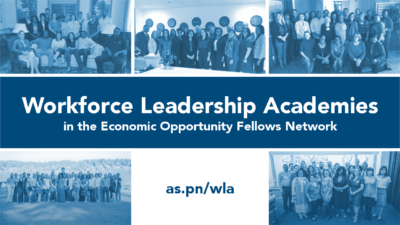 Despite the disruptions introduced by COVID-19, our Workforce Leadership Academies in Dallas and Detroit are forging ahead. Fellows have moved their convenings online and are eagerly embracing the new virtual learning format. The virtual format allows Fellows to continue building community and reflect together on the ways their work may change in light of the new realities created by COVID-19.
Despite the disruptions introduced by COVID-19, our Workforce Leadership Academies in Dallas and Detroit are forging ahead. Fellows have moved their convenings online and are eagerly embracing the new virtual learning format. The virtual format allows Fellows to continue building community and reflect together on the ways their work may change in light of the new realities created by COVID-19.
There’s Never Been a Better Time to Invest in Workers
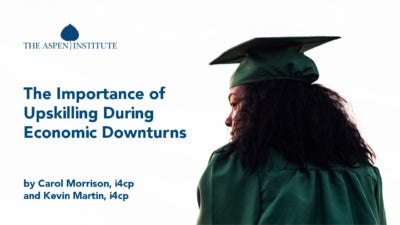 Faced with the possibility of an economic recession, companies often cut funding to learning and development. But halting such investments is a strategic misstep, and in times of uncertainty, the value of your workforce becomes even more apparent. In a guest blog post for UpSkill America, i4cp’s Carol Morrison and Kevin Martin describe how upskilling reflects a company’s commitment to a better future. Seeing a downturn as an opportunity for advancement is a winning strategy for businesses and their employees. Read more.
Faced with the possibility of an economic recession, companies often cut funding to learning and development. But halting such investments is a strategic misstep, and in times of uncertainty, the value of your workforce becomes even more apparent. In a guest blog post for UpSkill America, i4cp’s Carol Morrison and Kevin Martin describe how upskilling reflects a company’s commitment to a better future. Seeing a downturn as an opportunity for advancement is a winning strategy for businesses and their employees. Read more.
What types of skills should employers promote? Foundational digital skills, say UpSkill America’s Jaime Fall and Alison Ascher Webber of EdTech Center @ World Education. Too often, people who want to succeed in our increasingly digital economy are held back by an education and training ecosystem that wasn’t built with the needs of adult learners in mind. As a result, gaps in digital literacy perpetuate existing disparities and millions are locked out of the opportunities presented by our changing economy. Upskilling can be a force for equity, but we must make it so. Read more.
Tweeting Job Equity and COVID-19
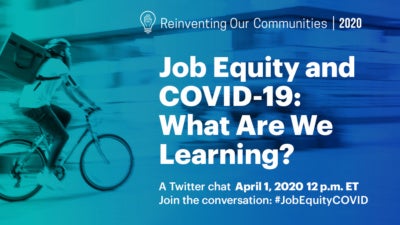 EOP participated in a Twitter chat hosted by the Federal Reserve Bank of Philadelphia on “Job Equity and COVID-19: What Are We Learning?” As the organizers note, “COVID-19 is making it clearer than ever how economic insecurity for workers impacts our shared prosperity.” This discussion explored how organizations can promote job equity during and beyond the current crisis. Dozens of participants from across the country took part in the virtual exchange, including EOP staff and many of our partner organizations who are committed to making the most of this moment. View the chat using the hashtag #JobEquityCOVID.
EOP participated in a Twitter chat hosted by the Federal Reserve Bank of Philadelphia on “Job Equity and COVID-19: What Are We Learning?” As the organizers note, “COVID-19 is making it clearer than ever how economic insecurity for workers impacts our shared prosperity.” This discussion explored how organizations can promote job equity during and beyond the current crisis. Dozens of participants from across the country took part in the virtual exchange, including EOP staff and many of our partner organizations who are committed to making the most of this moment. View the chat using the hashtag #JobEquityCOVID.
Upcoming at EOP
April 21 – Webinar: Worker Organizations Respond to the COVID-19 Crisis
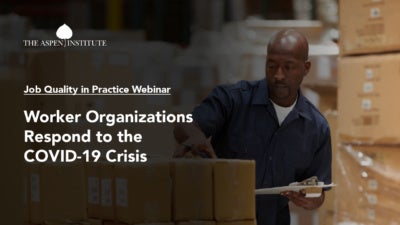 The global pandemic and economic aftermath place us in a time of unprecedented uncertainty with respect to our work and well-being. Frontline workers are once again bearing the brunt, and the divides of race, ethnicity, gender, and place are further exacerbated. We invite you to join us for our next Job Quality in Practice webinar, “Worker Organizations Respond to the COVID-19 Crisis,” to discuss how we can raise the voices and bargaining power of worker during and beyond the current crisis. Click here to register.
The global pandemic and economic aftermath place us in a time of unprecedented uncertainty with respect to our work and well-being. Frontline workers are once again bearing the brunt, and the divides of race, ethnicity, gender, and place are further exacerbated. We invite you to join us for our next Job Quality in Practice webinar, “Worker Organizations Respond to the COVID-19 Crisis,” to discuss how we can raise the voices and bargaining power of worker during and beyond the current crisis. Click here to register.
Join the conversation
Follow us on social media to join the conversation.
Tweet What’s new at EOP? Learn how the @AspenInstitute Economic Opportunities Program is helping people connect to and thrive in a changing economy.
About EOP
The Economic Opportunities Program (EOP) advances strategies, policies, and ideas to help low- and moderate-income people thrive in a changing economy. We recognize that race, gender, and place intersect with and intensify the challenge of economic inequality and we address these dynamics by advancing an inclusive vision of economic justice. For over 25 years, EOP has focused on expanding individuals’ opportunities to connect to quality work, start businesses, and build economic stability that provides the freedom to pursue opportunity. For more information, visit as.pn/eop.
EOP has several initiatives, including the Business Ownership Initiative, Workforce Strategies Initiative, UpSkill America, and Good Companies/Good Jobs. In addition, across these approaches EOP hosts the Economic Opportunity Fellows Network and the Opportunity in America event series.
The Aspen Institute is a global nonprofit organization committed to realizing a free, just, and equitable society. Founded in 1949, the Institute drives change through dialogue, leadership, and action to help solve the most important challenges facing the United States and the world. Headquartered in Washington, DC, the Institute has a campus in Aspen, Colorado, and an international network of partners. For more information, visit aspeninstitute.org.
Thank you to our many partners and funders for supporting our efforts.
Keep in touch
Click here to join our mailing list or sign up below. For updates every day, follow us on social media.
